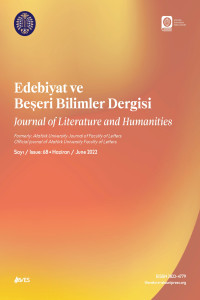J.J. ROUSSEAU ÜZERİNE PSİKANALİTİK BİR ELEŞTİRİ: PUER AETERNUS ARKETİPİNİN OLUMSUZ BİR VEÇHESİ
Jean-Jacques Rousseau (1712-1778), tarihi veya şahsi olarak özgün ve son derece tartışmalı bir figürdür. Romantik Akım’ın öncüsü olmuş ve Fransız Devrimi ortamı ile beraber İnsan Hakları Bildirgesi için büyük etkide bulunmuştur. Rousseau’nun kuramı, insanın uygarlık tarafından yozlaştırıldığı ve “gittiği her yerde zincire vurulduğu” fikri üzerine eğilmektedir. Bu çalışmada da, Rousseau’nun bu düşüncelerinin bilinçdışı bir önyargı tarafından, yani “puer aeternus” veya “ebedi çocuk” arketipin tarafından hakimiyet altına alındığı ya da yönlendirildiği savunulmuştur. Bu psikolojiyi serimlemek için, çalışmamızda, Rousseau hem tarihi bir figür hem de birey olarak (şahsi tecrübeleriyle birlikte) ele alınmıştır. Dolayısıyla Rousseau’nun şahsi psikolojisi ve felsefesinin -çağı ile ilişkide olarak- doğrudan birbirine bağlı olduğu öne sürülmektedir. Yaklaşımımızda da Jungcu psikanaliz benimsenmiş ve onun etrafında ilerlenmiştir.
Anahtar Kelimeler:
J.J. Rousseau, Jungcu Psikanaliz, C. G. Jung, M. L. von Franz, Ar-ketipler, Puer Aeternus, Romantizm, Bireyleşme.
A PSYCHOANALYTIC CRITICISM OF J.J. ROUSSEAU: A NEGATIVE ASPECT OF THE PUER AETERNUS ARCHETYPE
Jean-Jacques Rousseau (1712-1778), either historically or personally, is an original and a highly controversial figure. He has been the precursor of the Romantic Movement and has been a great influencer for the environment of the French Revolution and the Declaration of Human Rights which follows it. Rousseau’s theories are focused on the idea that man has been corrupted by civilization and “has been chained everywhere he goes”. It is stated in this paper that these ideas of Rousseau are driven by a certain psychological bias: a possession by the archetype of “puer aeternus” or “eternal child”. In order to open up this psychology, we took into consideration both Rousseau as a historical figure and an individual (along with his own experiences). It has been argued that personal psychology and philosophy of Rousseau -in rela-tionship with his time period- is thus interlinked. Our approach has tak-en Jungian psychoanalysis as its method and revolved around it.
Keywords:
J. J. Rousseau, Jungian Psychoanalysis, C. G. Jung, M. L. von Franz, Archetypes, Puer Aeternus, Romanticism, Individuation.,
___
- Barrie, J. M. (2017). Peter Pan, pp. 187-188. İstanbul: Karbon Kitaplar. (1904).
- Damrosch, Leo. (2007). Jean-Jacques Rousseau – Restless Genius. New York: Houghton Mifflin Company.
- Franz, Marie-Louise von. (2000). The Problems of Puer Aeternus. Toronto: Inner City Books.
- Franz, Marie-Louise von. (2017). Interpretation of Fairy Dreams. Colorado: Shambala Publications Inc.
- Geçtan, Engin. (2017). Psikanaliz ve Sonrası. İstanbul: Metis Yayınları.
- Jung, Carl Gustav. (2015). Maskülen – Erilliğin Farklı Yüzleri. (Çev.: D. G. Erdin). İstanbul: Pinhan Yayıncılık. (1991).
- Jung, Carl Gustav. (1969). The Collected Works of C. G. Jung, (Edt.: Sir Read, H., Fordham M., Adler, G. and Mcguire W.), Volume 9, Part 1, The Archetypes and the Collective Unconscious. (Trans.: R. F. C. Hull). New York: Princeton University Press.
- Killey, Dan. (1997). Peter Pan Sendromu – Hiç Büyümeyen Erkekler. (Çev.: S. Kunt). Ankara: HYB Yayıncılık. (1983).
- Peterson, Jordan (2002). Maps of Meaning: The Architecture of Belief. New York: Routledge.
- Rank, Otto. (2019). Doğum Travması, ss. 104, 46. (Çev.: S. M. Tara). İstanbul: Metis Yayınları. (1988).
- Rousseau, Jean-Jacques. (2017a). Bilimler ve Sanatlar Üstüne Söylev. (Çev.: S. Eyüboğlu). İstanbul: Türkiye İş Bankası Kültür Yayınları. (1750).
- Rousseau, Jean-Jacques. (2008). Discours sur l’origine et l’inegalité parmi les hommes. Paris: Flammarion. (1755).
- Rousseau, Jean-Jacques. (2018). Emile ya da Eğitim Üzerine. (Çev. : Y. Avunç). İstanbul: Türkiye İş Bankası Kültür Yayınları. (1762).
- Rousseau, Jean-Jacques. (2016). İtiraflar. (Çev.: K. Somer). İstanbul: Islık Yayınları. (1782).
- Yayın Aralığı: Yılda 2 Sayı
- Başlangıç: 1970
- Yayıncı: Atatürk Üniversitesi
Sayıdaki Diğer Makaleler
JAPON TOPLUMUNDA DEĞİŞİM İZLERİ: ZAMAN SERİSİ VERİLERİ IŞIĞINDA
ARAP ŞİİR TENKİDİ TARİHİNDE FARKLI BİR KİMLİK: SÜKEYNE
TÜRK EDEBİYATININ BAĞLAMLI DİZİNLERİ VE İŞLEVSEL SÖZLÜĞÜ SİSTEMİ (TEBDİZ)
POST-ENDÜSTRİYEL ÇAĞDA ENDÜSTRİYEL SOSYAL HİZMET UYGULAMALARI
MECALİS-İ SEB‘A VE FÎHİ MÂ FÎH’TE SÖZ VE SÖZÜN ÖNEMİ
ARİSTOTELES’İN ETİĞİNDE AHLAKİ EYLEMLERİN KARAKTER ERDEMLERİYLE OLAN İLİŞKİSİ
